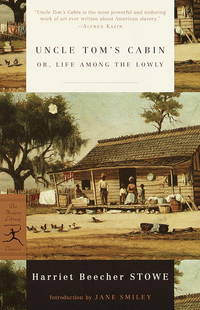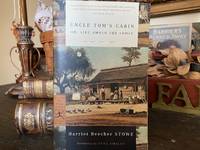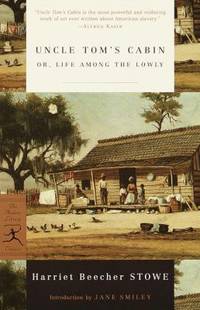About this book
In Uncle Tom’s Cabin by Harriett Beecher Stowe, the title character Uncle Tom is a long-suffering slave, loyal to both his faith and his master. Presented with an opportunity to escape, he instead chooses to remain in slavery to avoid embarrassing his master. After being sold to a slave trader, Tom suffers brutal treatment and is eventually beaten to death for his refusal to betray his friends — made to represent an ideal of true Christianity. Enormously popular (it was the best-selling novel of the 19th century) and influential, it’s publication in 1852 was instrumental in bringing visibility to the cruel reality of slavery. In more recent years, it has come under considerable criticism for its portrayal of meekness and subservience and the phrase “Uncle Tom” is sometimes used as an epithet for someone seen as overly subservient.
Summary
This unforgettable novel tells the story of Tom, a devoutly Christian slave who chooses not to escape bondage for fear of embarrassing his master. However, he is soon sold to a slave trader and sent down the Mississippi, where he must endure brutal treatment. This is a powerful tale of the extreme cruelties of slavery, as well as the price of loyalty and morality. When first published, it helped to solidify the anti-slavery sentiments of the North, and it remains today as the book that helped move a nation to civil war.
From the publisher
Harriet Beecher Stowe, a prolific writer best remembered today for Uncle Tom's Cabin, was born in Litchfield, Connecticut, on June 14, 1811, into a prominent New England family. Her father, Lyman Beecher, was a well-known Congregational minister, and her brother Henry Ward Beecher became a distinguished preacher, orator, and lecturer. Like all the Beechers she grew up with a strong sense of wanting to improve humanity. At the age of thirteen Harriet Beecher enrolled in the Hartford Female Seminary and subsequently taught there until 1832, when the family moved to Cincinnati. In Ohio she was an instructor at a school founded by her elder sister Catharine, and she soon began publishing short stories in the Western Monthly Magazine.
Four years later, in 1836, Harriet Beecher married Calvin Stowe, a respected biblical scholar and theologian by whom she had seven children. In order to supplement the family's meager income she continued writing. The Mayflower, her first collection of stories and sketches, appeared in 1843. During this period abolitionist conflicts rocked Cincinnati, and Mrs. Stowe witnessed firsthand the misery of slaves living just across the Ohio River in Kentucky. But not until the passage of the Fugitive Slave Act of 1850 was she inspired to write about their plight. After the family resettled in Brunswick, Maine, when Mr. Stowe was hired as a professor at Bowdoin College, she began working on a novel that would expose the evils of slavery.
First serialized in the National Era, an abolitionist paper, in forty weekly installments between June 5, 1851, and April 1, 1852, and published as a book on March 20, 1852, Uncle Tom's Cabin was an enormous success. Tolstoy deemed it a great work of literature 'flowing from love of God and man,' and within a year the book had sold more than 300,000 copies. When Uncle Tom's Cabin appeared in Great Britain Queen Victoria sent Mrs. Stowe a note of gratitude, and enthusiastic crowds greeted the author in London on her first trip abroad in 1853. In an attempt to silence the many critics at home who denounced the work as vicious propaganda, Mrs. Stowe brought out A Key to Uncle Tom's Cabin in 1853, which contained documentary evidence substantiating the graphic picture of slavery she had drawn. Dred (1856), a second antislavery novel, did not enjoy the acclaim of Uncle Tom's Cabin, yet the author had already stirred the conscience of the nation and the world, fueling sentiments that would ignite the Civil War. When Abraham Lincoln met her at the White House in 1862 he allegedly remarked: 'So you're the little woman who wrote the book that started this great war!'
In subsequent novels Stowe shifted her attention away from the issue of slavery. Beginning with The Minister's Wooing (1859), and continuing with The Pearl of Orr's Island (1862), Oldtown Folks (1869), and Poganuc People (1878), she presented a perceptive and realistic chronicle of colonial New England, focusing especially on the theological warfare that underscored Puritan life. In a second and less popular series of novels—My Wife and I (1871), Pink and White Tyranny (1871), and We and Our Neighbors (1875)—she depicted the mores of post-Civil War America. Mrs. Stowe did enjoy success, however, with the controversial Lady Byron Vindicated (1870), a bold defense of her friend Anne, Lady Byron, that scandalously revealed Lord Byron's moral delinquency. In addition she became a regular contributor to the Atlantic Monthly, which published many of the memorable short stories later collected in Oldtown Fireside Stories (1872) and Sam Lawson's Oldtown Fireside Stories (1881).
Harriet Beecher Stowe wrote little during the last years of her life. She died in Hartford, Connecticut, on July 1, 1896. Perhaps Mrs. Stowe's achievement was best summed up by abolitionist Frederick Douglass who said: 'Hers was the word for the hour.'
From the eBook edition.
From the jacket flap
When Uncle Tom's Cabin was published in 1852, it became an international blockbuster, selling more than 300,000 copies in the United States alone in its first year. Progressive for her time, Harriet Beecher Stowe was one of the earliest writers to offer a shockingly realistic depiction of slavery. Her stirring indictment and portrait of human dignity in the most inhumane circumstances enlightened hundreds of thousands by revealing the human costs of slavery, which had until then been cloaked and justified by the racist misperceptions of the time. Langston Hughes called it "a moral battle cry," noting that "the love and warmth and humanity that went into its writing keep it alive a century later," and Tolstoy described it as "flowing from love of God and man."
First Edition Identification
Uncle Tom’s Cabin was originally published serially over 40 weeks in the abolitionist journal The National Era, beginning June 5, 1851. It was published by John P. Jewett the following year in two volumes with six illustrated plates by Hammett Billings. The initial printing was 5000 copies and was made available in three different bindings: brown cloth with a gilt ornament on the front board, blue cloth with additional gilt ornamentation, and a paper wrapper. Subsequent editions were issued shortly thereafter, including a holiday “gift edition” in brown gilt cloth with additional illustrations by Billings and an inexpensive “Edition for the Million” in paper wrappers for 37 1/2 cents. The first printing has the following points of issue: “split” instead of “spiled” on page 42 of the first volume, “catechism” rather than “catechism” on page 74 of the second volume, and no attribution to Billings for the engravings. First edition, first printings generally exceed $5,000 and can reach upwards of $15,000 with Stowe’s signature.
Details
-
Title
Uncle Tom's Cabin: Or, Life Among the Lowly
-
Author
Harriet Beecher Stowe; Introduction by Jane Smiley
-
Binding
Paperback
-
Edition number
1st
-
Edition
1
-
Pages
688
-
Volumes
1
-
Language
ENG
-
Publisher
Modern Library, New York, New York, U.S.A.
-
Date
2001-01-09
-
ISBN
9780375756931 / 0375756930
-
Weight
1.19 lbs (0.54 kg)
-
Dimensions
8.03 x 5.15 x 1.17 in (20.40 x 13.08 x 2.97 cm)
-
Reading level
1050
-
Themes
- Chronological Period: 19th Century
- Chronological Period: 1851-1899
- Cultural Region: South
- Ethnic Orientation: African American
- Religious Orientation: Christian
- Topical: Civil War
-
Library of Congress subjects
Fugitive slaves, Political fiction
-
Library of Congress Catalog Number
00046558
-
Dewey Decimal Code
FIC
Excerpt
Late in the afternoon of a chilly day in February, two gentlemen were sitting alone
over their wine, in a well-furnished dining parlor, in the town of P—, in Kentucky.
There were no servants present, and the gentlemen, with chairs closely
approaching, seemed to be discussing some subject with great earnestness.
For convenience sake, we have said, hitherto, two gentlemen. One of the parties,
however, when critically examined, did not seem, strictly speaking, to come under
the species. He was a short, thick-set man, with coarse, commonplace features, and
that swaggering air of pretension which marks a low man who is trying to elbow his
way upward in the world. He was much over-dressed, in a gaudy vest of many
colors, a blue neckerchief, bedropped gayly with yellow spots, and arranged with a
flaunting tie, quite in keeping with the general air of the man. His hands, large and
coarse, were plentifully bedecked with rings; and he wore a heavy gold
watch-chain, with a bundle of seals of portentous size, and a great variety of colors,
attached to it,—which, in the ardor of conversation, he was in the habit of
flourishing and jingling with evident satisfaction. His conversation was in free and
easy defiance of Murray's Grammar, and was garnished at convenient intervals with
various profane expressions, which not even the desire to be graphic in our account
shall induce us to transcribe.
His companion, Mr. Shelby, had the appearance of a gentleman; and the
arrangements of the house, and the general air of the housekeeping, indicated easy,
and even opulent circumstances. As we before stated, the two were in the midst of
an earnest conversation.
'That is the way I should arrange the matter,' said Mr. Shelby.
'I can't make trade that way—I positively can't, Mr. Shelby,' said the other, holding
up a glass of wine between his eye and the light.
'Why, the fact is, Haley, Tom is an uncommon fellow; he is certainly worth that sum
anywhere—steady, honest, capable, manages my whole farm like a clock.'
'You mean honest, as niggers go,' said Haley, helping himself to a glass of brandy.
'No; I mean, really, Tom is a good, steady, sensible, pious fellow. He got religion at
a camp-meeting, four years ago; and I believe he really did get it. I've trusted him,
since then, with everything I have,—money, house, horses,—and let him come and
go round the country; and I always found him true and square in everything.'
'Some folks don't believe there is pious niggers, Shelby,' said Haley, with a candid
flourish of his hand, 'but I do. I had a fellow, now, in this yer last lot I took to
Orleans—'twas as good as a meetin', now, really, to hear that critter pray; and he was
quite gentle and quiet like. He fetched me a good sum, too, for I bought him cheap
of a man that was 'bliged to sell out; so I realized six hundred on him. Yes, I consider
religion a valeyable thing in a nigger, when it's the genuine article, and no mistake.'
'Well, Tom's got the real article, if ever a fellow had,' rejoined the other. 'Why, last
fall, I let him go to Cincinnati alone, to do business for me, and bring home five
hundred dollars. 'Tom,' says I to him, 'I trust you, because I think you're a
Christian—'I know you wouldn't cheat.' Tom comes back, sure enough; I knew he
would. Some low fellows, they say, said to him—'Tom, why don't you make tracks
for Canada?' 'Ah, master trusted me, and I couldn't'—they told me about it. I am sorry
to part with Tom, I must say. You ought to let him cover the whole balance of the
debt; and you would, Haley, if you had any conscience.'
'Well, I've got just as much conscience as any man in business can afford to
keep,—just a little, you know, to swear by, as 'twere,' said the trader, jocularly; 'and
then, I'm ready to do anything in reason to 'blige friends; but this yer, you see, is a
leetle too hard on a fellow—a leetle too hard.' The trader sighed contemplatively, and
poured out some more brandy.
'Well, then, Haley, how will you trade?' said Mr. Shelby, after an uneasy interval of
silence.
'Well, haven't you a boy or gal that you could throw in with Tom?'
'Hum!—none that I could well spare; to tell the truth, it's only hard necessity makes
me willing to sell at all. I don't like parting with any of my hands, that's a fact.'
Here the door opened, and a small quadroon boy, between four and five years of
age, entered the room. There was something in his appearance remarkably beautiful
and engaging. His black hair, fine as floss silk, hung in glossy curls about his
round, dimpled face, while a pair of large dark eyes, full of fire and softness, looked
out from beneath the rich, long lashes, as he peered curiously into the apartment. A
gay robe of scarlet and yellow plaid, carefully made and neatly fitted, set off to
advantage the dark and rich style of his beauty; and a certain comic air of
assurance, blended with bashfulness, showed that he had been not unused to
being petted and noticed by his master.
Media reviews
"Uncle Tom's Cabin is the most powerful and enduring work of art ever written about American slavery."
—Alfred Kazin
About the author
Harriet Beecher Stowe, a prolific writer best remembered today for Uncle Tom's Cabin, was born in Litchfield, Connecticut, on June 14, 1811, into a prominent New England family. Her father, Lyman Beecher, was a well-known Congregational minister, and her brother Henry Ward Beecher became a distinguished preacher, orator, and lecturer. Like all the Beechers she grew up with a strong sense of wanting to improve humanity. At the age of thirteen Harriet Beecher enrolled in the Hartford Female Seminary and subsequently taught there until 1832, when the family moved to Cincinnati. In Ohio she was an instructor at a school founded by her elder sister Catharine, and she soon began publishing short stories in the Western Monthly Magazine. Four years later, in 1836, Harriet Beecher married Calvin Stowe, a respected biblical scholar and theologian by whom she had seven children. In order to supplement the family's meager income she continued writing. The Mayflower, her first collection of stories and sketches, appeared in 1843. During this period abolitionist conflicts rocked Cincinnati, and Mrs. Stowe witnessed firsthand the misery of slaves living just across the Ohio River in Kentucky. But not until the passage of the Fugitive Slave Act of 1850 was she inspired to write about their plight. After the family resettled in Brunswick, Maine, when Mr. Stowe was hired as a professor at Bowdoin College, she began working on a novel that would expose the evils of slavery. First serialized in the National Era, an abolitionist paper, in forty weekly installments between June 5, 1851, and April 1, 1852, and published as a book on March 20, 1852, Uncle Tom's Cabinwas an enormous success. Tolstoy deemed it a great work of literature 'flowing from love of God and man, ' and within a year the book had sold more than 300,000 copies. When Uncle Tom's Cabin appeared in Great Britain Queen Victoria sent Mrs. Stowe a note of gratitude, and enthusiastic crowds greeted the author in London on her first trip abroad in 1853. In an attempt to silence the many critics at home who denounced the work as vicious propaganda, Mrs. Stowe brought out A Key to Uncle Tom's Cabin in 1853, which contained documentary evidence substantiating the graphic picture of slavery she had drawn. Dred (1856), a second antislavery novel, did not enjoy the acclaim of Uncle Tom's Cabin, yet the author had already stirred the conscience of the nation and the world, fueling sentiments that would ignite the Civil War. When Abraham Lincoln met her at the White House in 1862 he allegedly remarked: 'So you're the little woman who wrote the book that started this great war!' In subsequent novels Stowe shifted her attention away from the issue of slavery. Beginning with The Minister's Wooing (1859), and continuing with The Pearl of Orr's Island (1862), Oldtown Folks (1869), and Poganuc People (1878), she presented a perceptive and realistic chronicle of colonial New England, focusing especially on the theological warfare that underscored Puritan life. In a second and less popular series of novels--My Wife and I (1871), Pink and White Tyranny (1871), and We and Our Neighbors (1875)--she depicted the mores of post-Civil War America. Mrs. Stowe did enjoy success, however, with the controversial Lady Byron Vindicated (1870), a bold defense of her friend Anne, Lady Byron, that scandalously revealed Lord Byron's moral delinquency. In addition she became a regular contributor to the Atlantic Monthly, which published many of the memorable short stories later collected in Oldtown Fireside Stories (1872) and Sam Lawson's Oldtown Fireside Stories (1881). Harriet Beecher Stowe wrote little during the last years of her life. She died in Hartford, Connecticut, on July 1, 1896. Perhaps Mrs. Stowe's achievement was best summed up by abolitionist Frederick Douglass who said: 'Hers was the word for the hour.'











